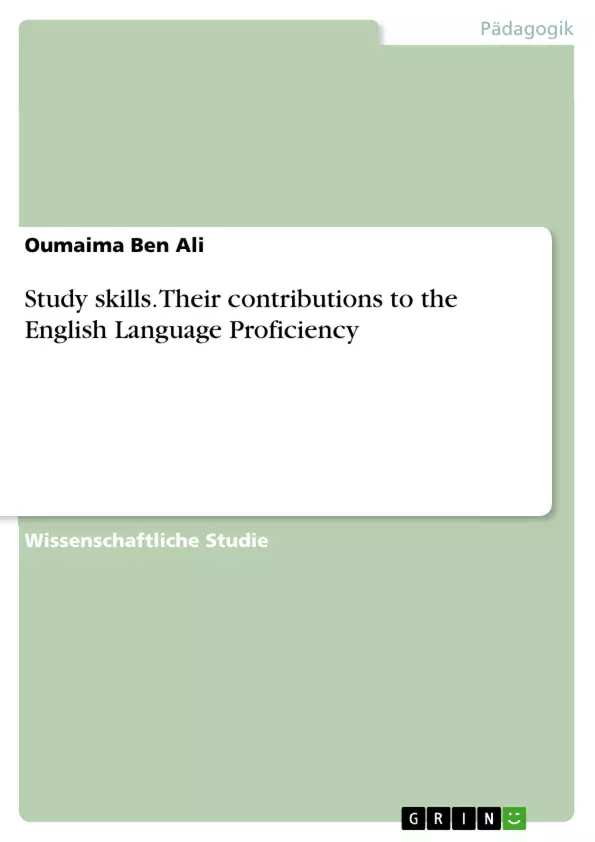The purpose of this research is to highlight the contribution of study skills to academic competence. It investigates the actual denominators resulting in student’s academic failure and addresses the issue of students’ non-strategic ways of dealing with academic content. It also identifies scientific evidence-based strategies that are effective in helping students improve their study skills. Over 100 students completed a questionnaire to determine how study skills affect the students’ academic achievements. In this respect, effective evidence-based strategies were grouped into taking notes, planning and organization, focus and concentration, and memory hacks.
The research is composed of four chapters, whose general aim is to investigate the contribution of study skills to academic competence. The first chapter reviews the existing literature on study skills research and experiments, as well as the major findings in the field of study skills. The second chapter introduces the methodological procedures and research designs that were utilized to elicit data. The third chapter demonstrates the results of the study along with a critical analysis of the variables involved. As for the fourth chapter, a discussion takes place elucidating different perceptions of the study’s findings and implications. Finally, a conclusion of the study is drawn, and references are cited in the end.
Academic competence is associated with the knowledge and application of effective study skills. Capable students at all grade levels may experience difficulty in school, not because they lack ability, but because they lack good study skills. Although some students develop study skills independently, even normally achieving students may go through school without having acquired effective approaches for studying.
Implementing study-skills instruction relies on an understanding of the theoretical foundation for teaching and using study skills, as well as knowledge of current research on the effectiveness of study strategies. The purpose of this article is to articulate a theoretical perspective on the contribution of study skills to academic competence, and to identify evidence-based strategies that are effective in helping students study.
Inhaltsverzeichnis
- Abstract
- Introduction
- General background
- Rationale
- Problem statement
- Purpose of the study
- Objectives of the study
- Research questions
- Research hypothesis
- Overview of the research methodology
- Significance of the study
- Limitations and delimitations
- Structure of the study
- Terminology
- CHAPTER 1: Literature Review
- CHAPTER 2: Methodology
- CHAPTER 3: Results
- CHAPTER 4: Discussion
Zielsetzung und Themenschwerpunkte
Diese Forschungsarbeit untersucht den Einfluss von Lerntechniken auf die akademische Kompetenz von Studenten. Sie analysiert die Ursachen für akademisches Scheitern und befasst sich mit den nicht-strategischen Ansätzen von Studenten im Umgang mit akademischen Inhalten. Die Studie identifiziert wissenschaftlich fundierte Strategien, die Studenten helfen können, ihre Lerntechniken zu verbessern.
- Die Bedeutung von Lerntechniken für akademische Erfolge.
- Die Analyse von Ursachen für akademisches Scheitern.
- Die Identifizierung effektiver, wissenschaftlich fundierter Lernstrategien.
- Die Bewertung der Anwendung von Lerntechniken durch Studenten.
- Die Implikationen der Forschungsergebnisse für Studenten, Dozenten und die Verwaltung der Universität.
Zusammenfassung der Kapitel
Kapitel 1 bietet einen umfassenden Überblick über die bestehende Literatur zum Thema Lerntechniken und akademische Kompetenz. Es beleuchtet verschiedene Definitionen, Theorien und Forschungsbefunde, die den Zusammenhang zwischen Lerntechniken und akademischem Erfolg untersuchen.
Kapitel 2 beschreibt die Forschungsmethodik, die in dieser Studie verwendet wurde. Es erläutert die Stichprobengröße, die Datenerhebungsmethode, die verwendeten Instrumente sowie die Analysemethoden der gesammelten Daten.
Kapitel 3 präsentiert die Ergebnisse der Studie. Es analysiert die Daten, die von den teilnehmenden Studenten erhoben wurden, und präsentiert die Ergebnisse der quantitativen und qualitativen Analyse.
Kapitel 4 diskutiert die Ergebnisse der Studie im Kontext der bestehenden Literatur. Es interpretiert die Ergebnisse, zieht Schlussfolgerungen und identifiziert die Auswirkungen der Studie für die Praxis.
Schlüsselwörter
Lerntechniken, akademische Kompetenz, akademisches Scheitern, Studienerfolg, effektive Lernstrategien, wissenschaftlich fundierte Methoden, Studenten, Hochschule, Universität, Bildung, Forschung.
Häufig gestellte Fragen
Warum sind Lerntechniken wichtig für den akademischen Erfolg?
Lerntechniken (Study Skills) ermöglichen es Studenten, akademische Inhalte strategisch zu verarbeiten, was oft entscheidender ist als die reine Begabung.
Welche konkreten Lernstrategien werden in der Studie untersucht?
Die Studie gruppiert effektive Strategien in Notizen machen, Planung und Organisation, Fokus und Konzentration sowie Gedächtnis-Hacks.
Was sind die Hauptursachen für akademisches Scheitern?
Häufig scheitern Studenten nicht an mangelnder Intelligenz, sondern an nicht-strategischen Ansätzen im Umgang mit komplexen Lerninhalten.
Wie wurde die Forschung durchgeführt?
Über 100 Studenten füllten Fragebögen aus, um den Zusammenhang zwischen ihren Lerntechniken und ihren Leistungen zu ermitteln.
Welche Bedeutung hat die Studie für Universitäten?
Die Ergebnisse liefern Implikationen für Dozenten und Verwaltungen, wie sie Studenten durch gezielte Instruktionen in Lerntechniken unterstützen können.
- Citation du texte
- Oumaima Ben Ali (Auteur), 2020, Study skills. Their contributions to the English Language Proficiency, Munich, GRIN Verlag, https://www.grin.com/document/941454



